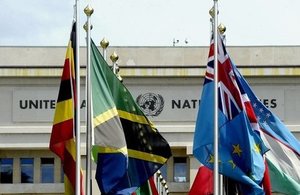Universal Periodic Review 27: UK Report Adoption Remarks
This statement was delivered by the UK on 9 May during the adoption of the UK's Universal Periodic Review report.

The Universal Periodic Review takes place at the Palais des Nations in Geneva
I would like to begin by saying how much the UK welcomed the opportunity of its third Universal Periodic Review to speak about the importance the United Kingdom attaches to human rights and some of the ways we are seeking to put our commitment to human rights into effect in a way that benefits the lives of everybody in our country.
The United Kingdom appreciated the constructive engagement of other member states during its review. It was extremely helpful to hear the many different viewpoints and perspectives expressed. We were pleased to hear that a number of states congratulated us on the progress we had made to implement the recommendations we received at our 2012 review, and for the measures we have been taking to combat modern slavery. We also appreciated that a number of states challenged us to go further, in line with the spirit of the UPR process. The United Kingdom welcomes this exchange and whilst we have a good human rights record, we recognise that there is always room for improvement and we remain open to learning from others.
As has been the UK practice at our previous two reviews, the United Kingdom’s intention is to reserve its position on all the recommendations we received. We are doing this so that we can consult other Departments in the UK Government and the Devolved Administrations, as well as the United Kingdom’s three National Human Rights Institutions and civil society organisations. We will therefore respond formally to the Human Rights Council in September this year, stating which recommendations we note, and which we support.
In response to the statement made by Argentina, the United Kingdom has no doubt about its sovereignty over the Falkland Islands and South Georgia & South Sandwich Islands and surrounding maritime areas, nor about the principle and the right of the Falkland Islanders to self-determination as enshrined in the UN Charter and in article one of the two UN Covenants on human rights, by virtue of which they freely determine their political status and freely pursue their economic, social and cultural development.
This means there can be no dialogue on sovereignty unless the Falkland Islanders so wish. The 2013 referendum - in which 99.8% of those who voted wanted to maintain their current status as a territory of the United Kingdom - sent a clear message that the people of the Islands do not want dialogue on sovereignty. Argentina should respect those wishes.
The United Kingdom remains deeply committed to the success of the Universal Periodic Review. We view it as a unique and crucial mechanism for sharing best practice on human rights around the world and promoting continual improvement of human rights on the ground.
The UPR must also be seen as an ongoing and continuous process - not simply a three and a half hour dialogue that occurs every four and a half years. It is the implementation in between each review that has the potential for far-reaching impact. Our aim is that the third cycle of the UPR gives an increased focus on implementation of recommendations and we were pleased to deliver a joint statement on UPR led jointly with Paraguay, Brazil and Morocco at the March session of the Human Rights Council, which addressed the importance of implementation.
Finally, the United Kingdom would like to put on record its gratitude to the Troika, especially Her Excellency, Filloreta Kodra the Permanent Representative of Albania, and Mr Yibza Aynekullu from Ethiopia, Mr Fatjon Demneri from Albania and Ms. Ariun Adiya from Mongolia and the Human Rights Council Secretariat for the professional way in which the UK’s review was conducted and the efficient way in which the Working Group report was prepared.
We look forward to carrying forward our assessment and implementation of the recommendations over the next four and half years.